Abstract
Properties of filamentous acetamidofluorescein-labeled actin and acetamidotetramethylrhodamine-labeled actin (AF and ATR-actin, respectively) were examined to resolve discrepancies in the reported translational diffusion coefficients of F-actin measured in vitro by FPR and other techniques. Using falling-ball viscometry and two independent versions of fluorescence photobleaching recovery (FPR), the present data indicate that several factors are responsible for these discrepancies. Gel filtration chromatography profoundly affects the viscosity of actin solutions and filament diffusion coefficients. ATR-actin and, to a lesser degree, AF-actin show a reduction in viscosity in proportion to the fraction labeled, presumably due to filament shortening. Actin filaments containing AF-actin or ATR-actin are susceptible to photoinduced damage, including a covalent cross-linking of actin protomers within filaments and an apparent cleavage of filaments detected by a decrease of the measured viscosity and an increase in the measured filament diffusion coefficients. Quantum yields of the two photoinduced effects are quite different. Multiple cross-links are produced relative to each photobleaching event, whereas less than 1% filament cleavage occurs. Substantial differences in the filament diffusion coefficients measured by FPR are also the result of differences in illumination geometry and sampling time. However, under controlled conditions, FPR can be used as a quantitative tool for measuring the hydrodynamic properties of actin filaments. Incremented filament shortening caused by photoinduced cleavage or incremental addition of filament capping proteins produces a continuous and approximately linear increase of filament diffusion coefficients, indicating that filaments are not associated in solution. Our results indicate that actin filaments exhibit low mobilities and it is inferred that actin filaments formed in vitro by column-purified actin, under standard conditions, are much longer than has conventionally been presumed.
Full text
PDF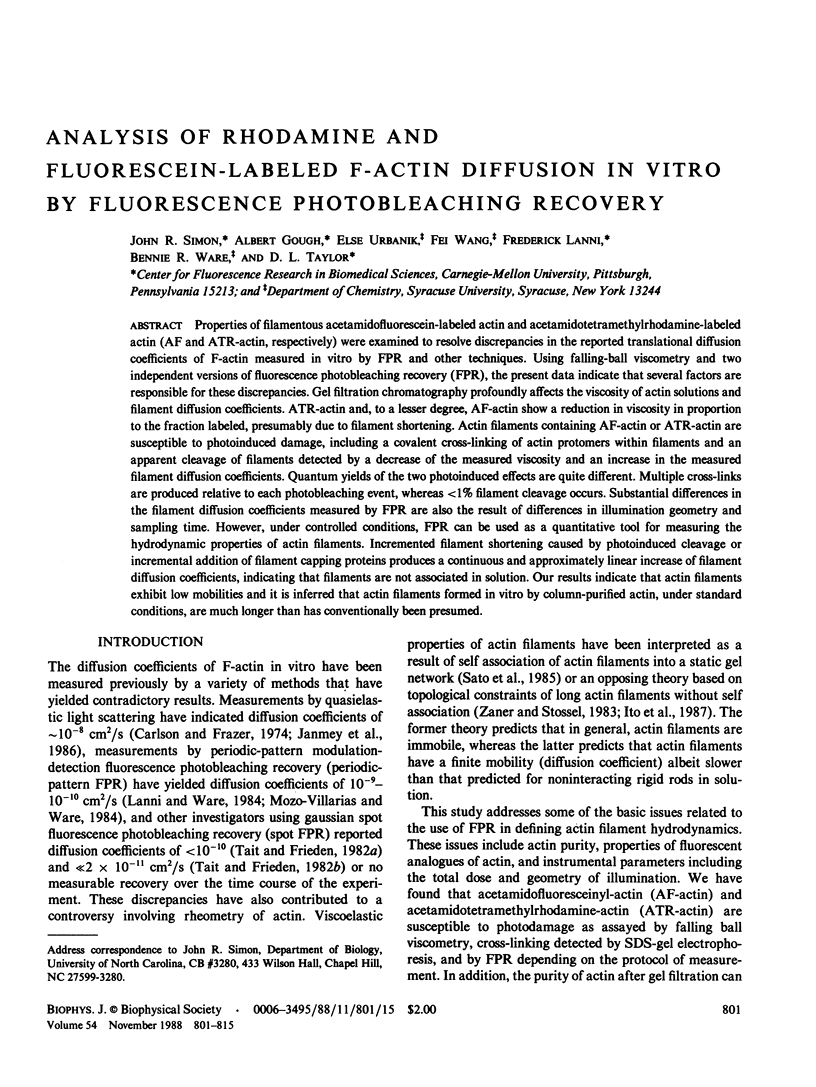
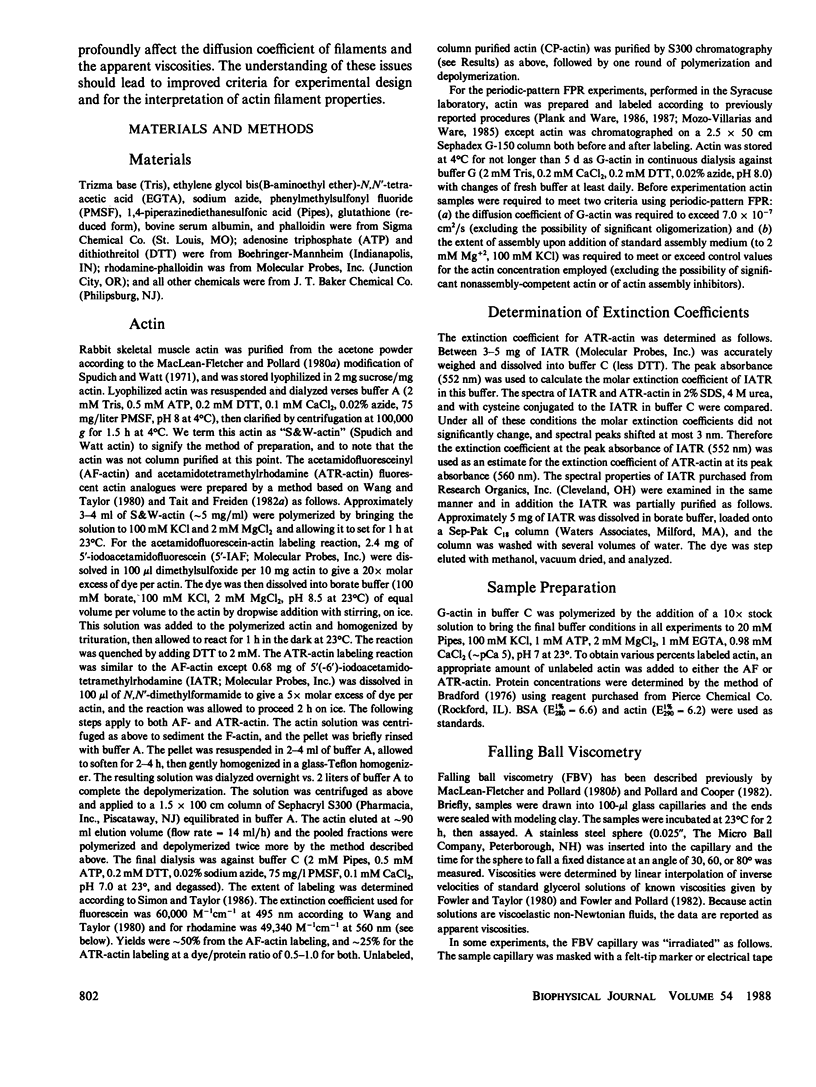
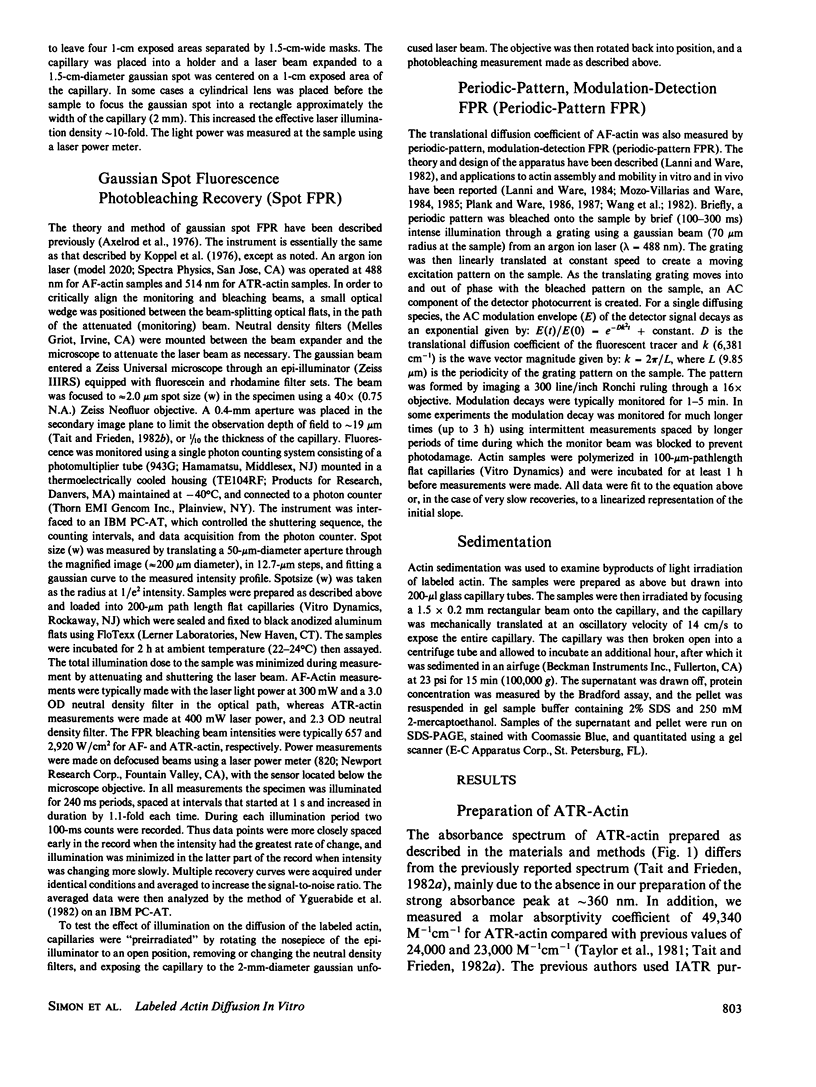
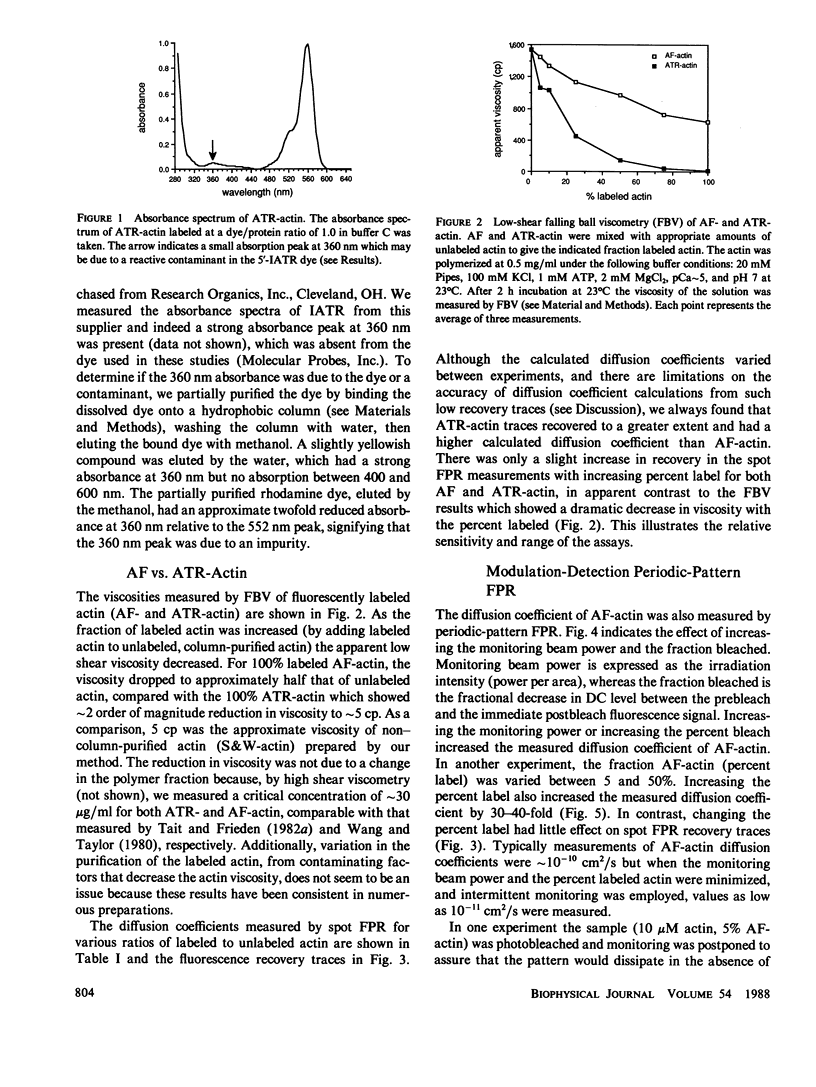
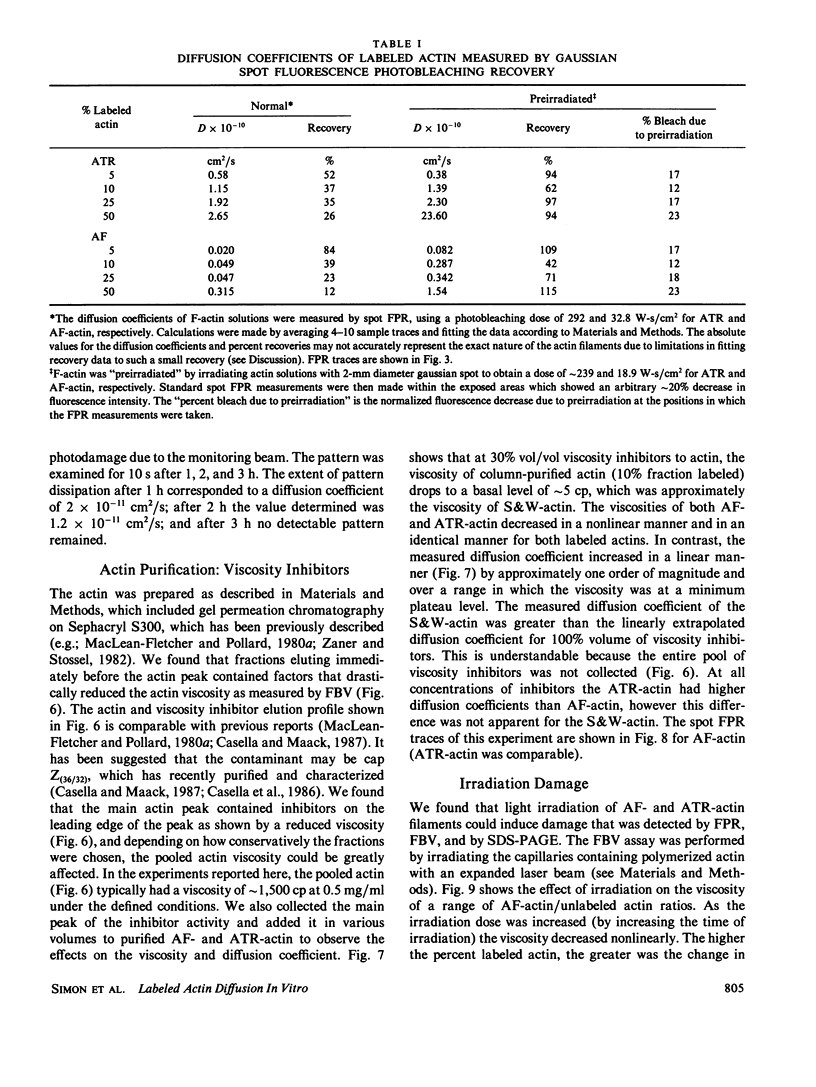
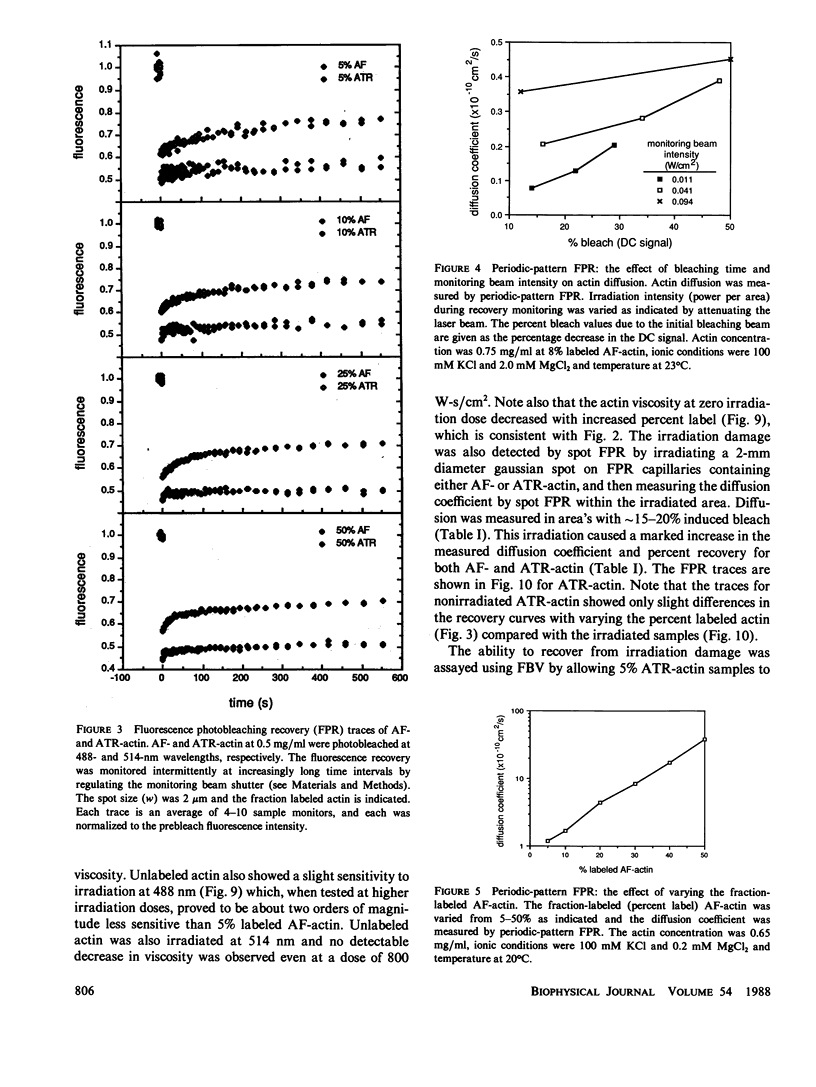
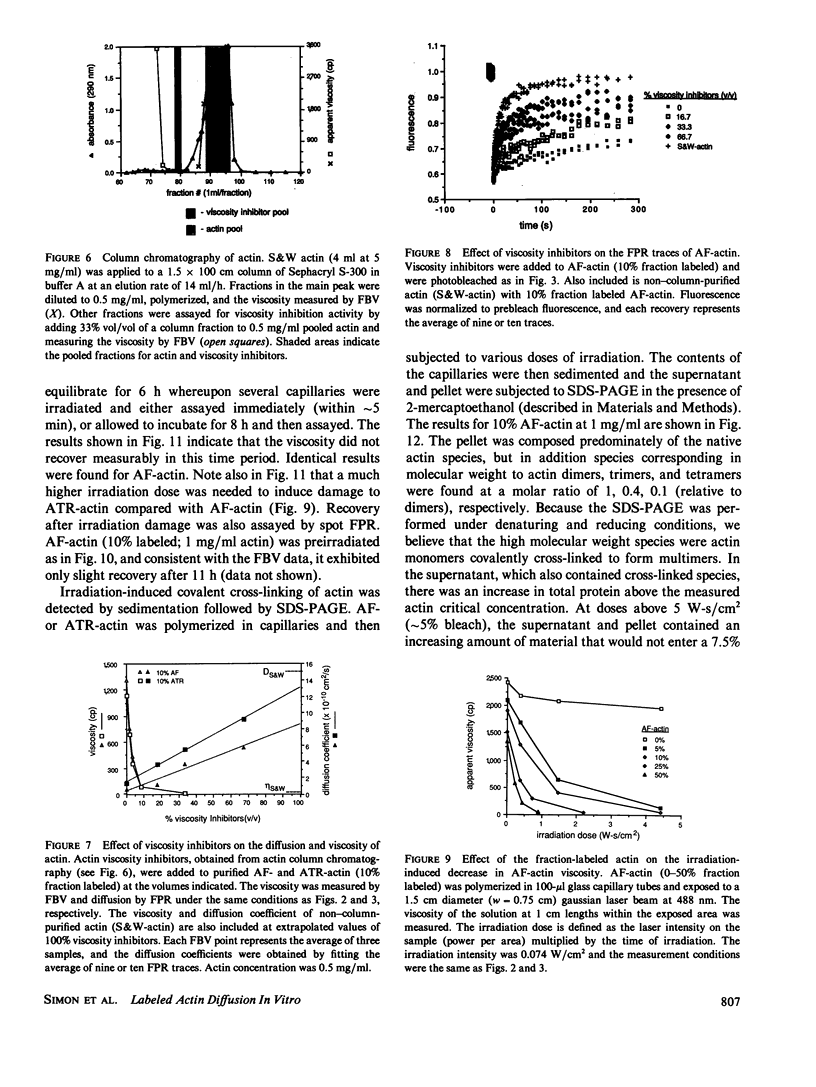
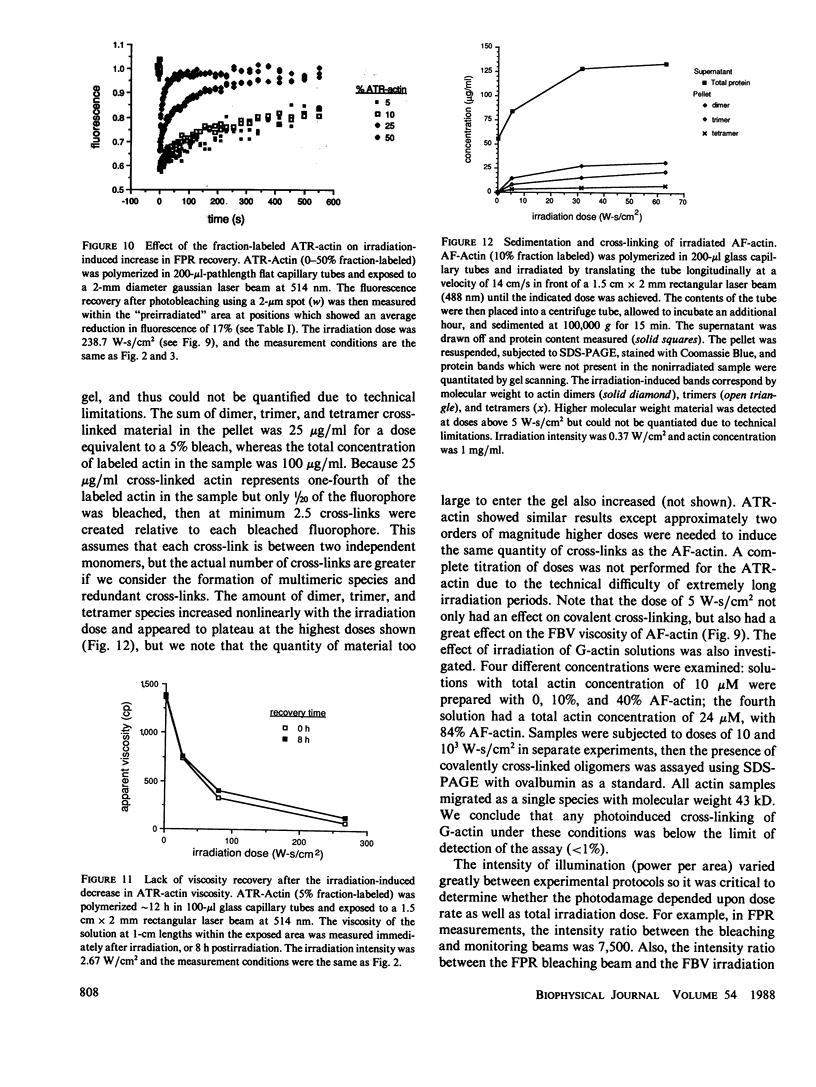
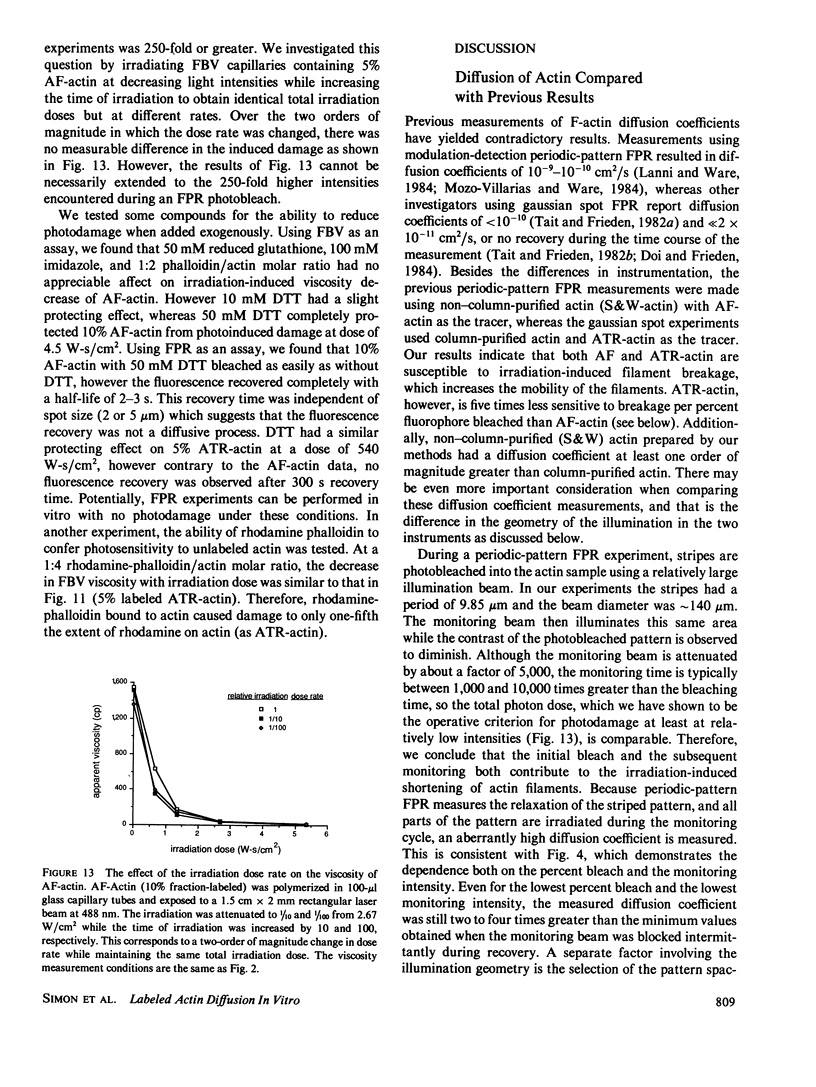
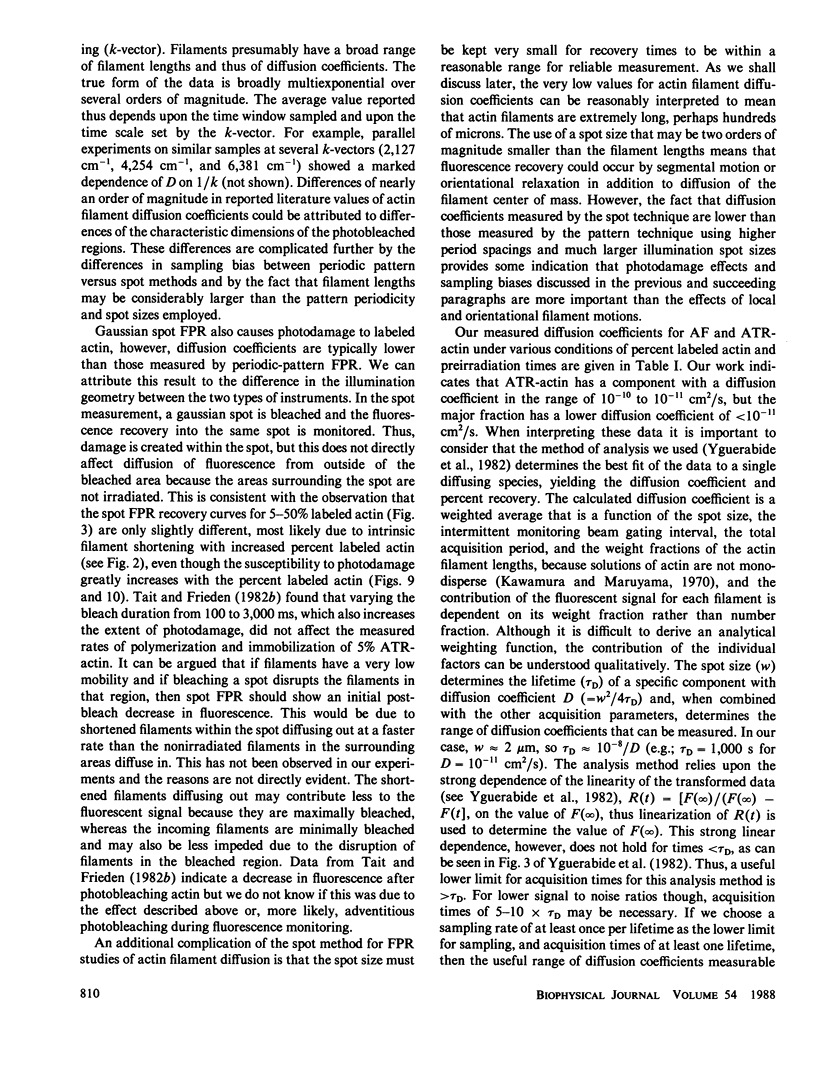
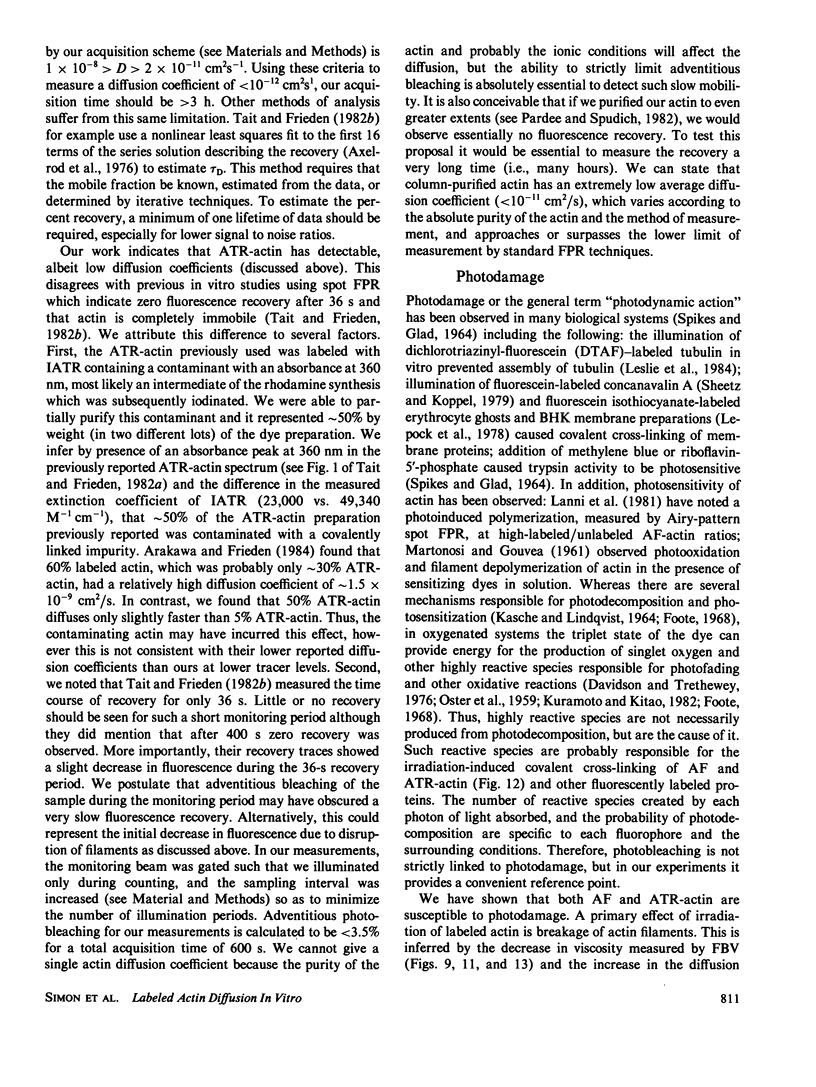
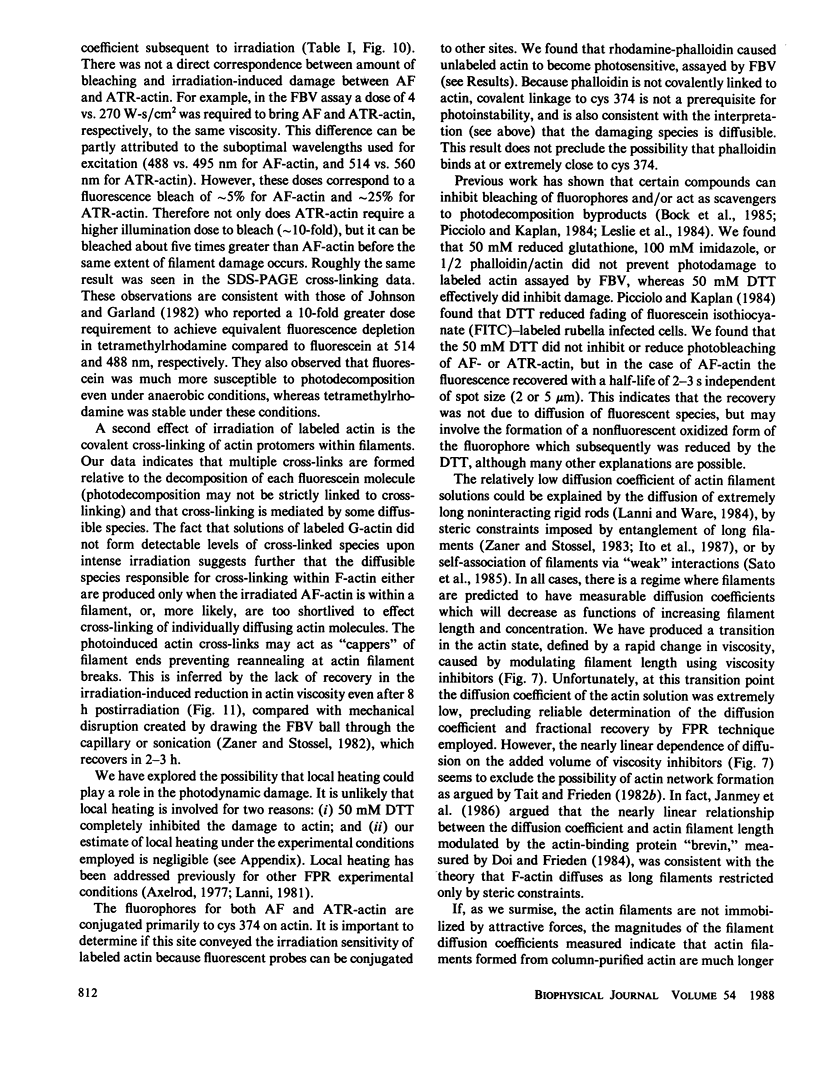
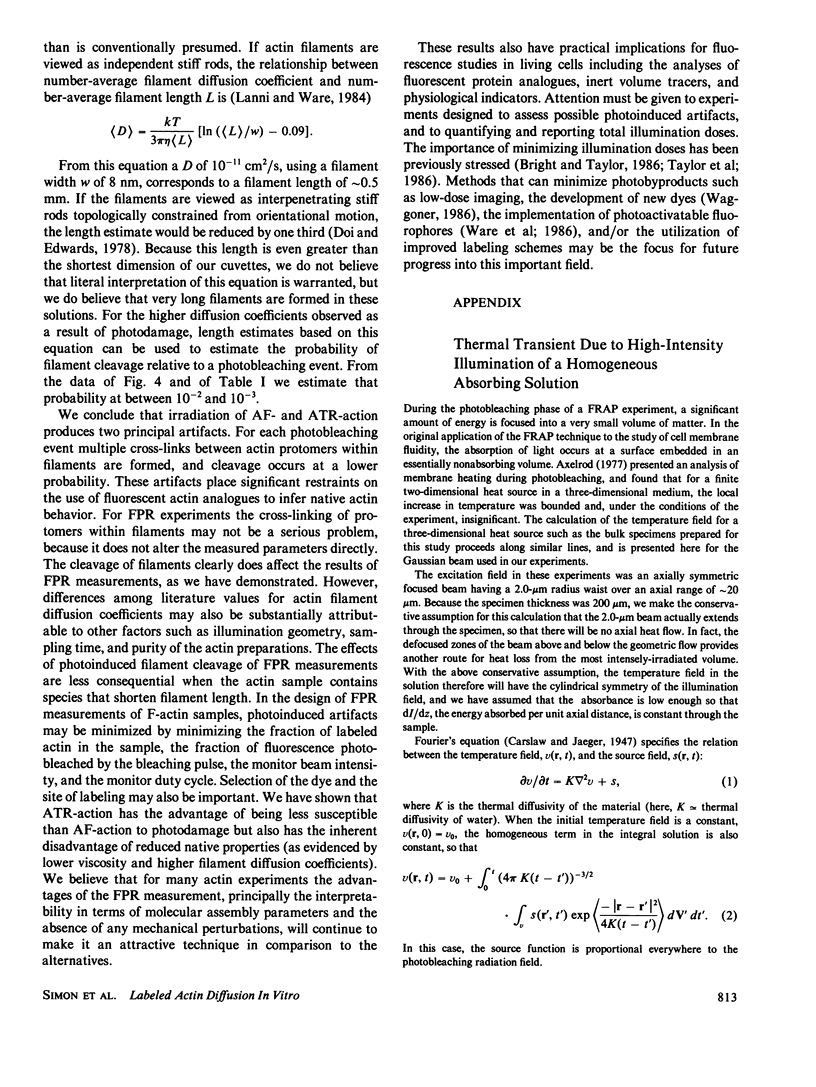
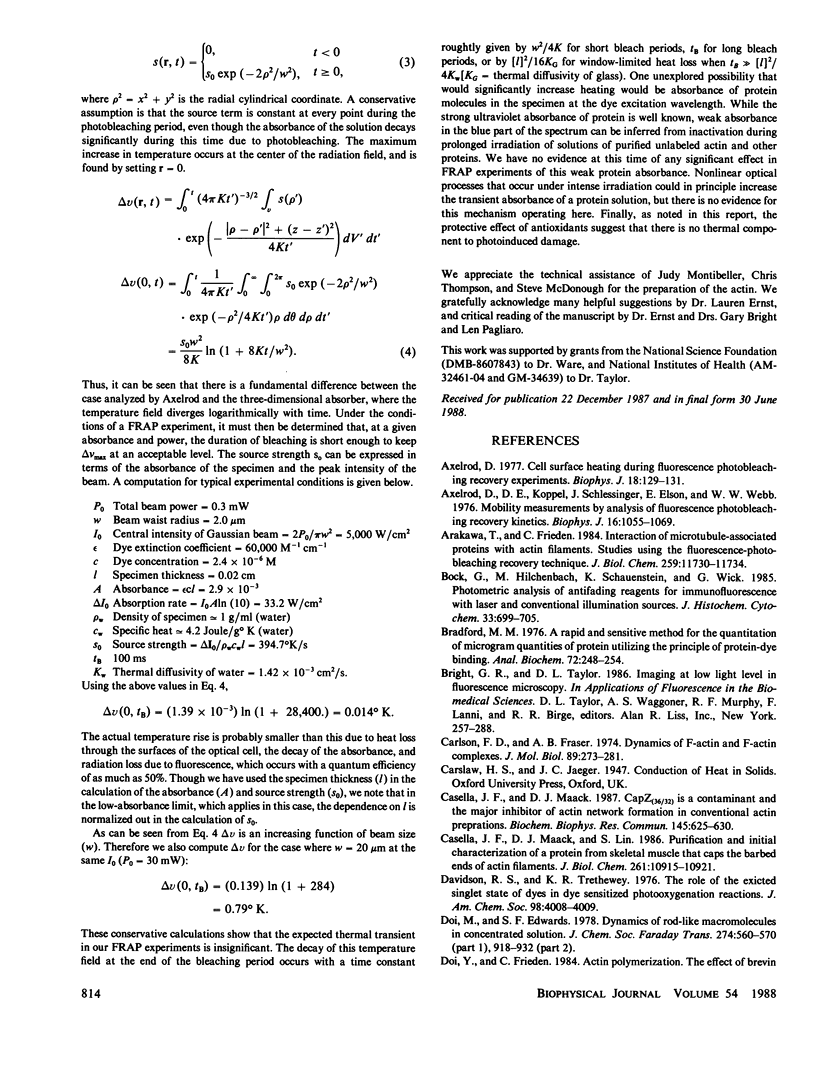
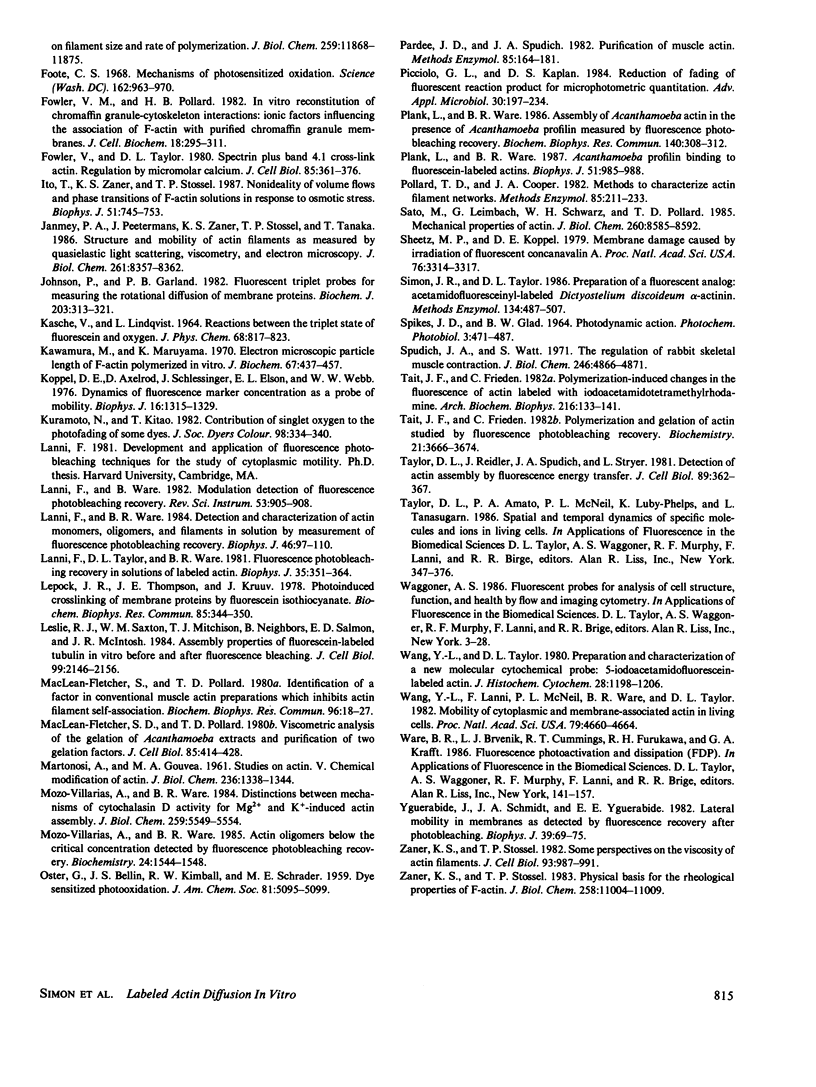
Images in this article
Selected References
These references are in PubMed. This may not be the complete list of references from this article.
- Arakawa T., Frieden C. Interaction of microtubule-associated proteins with actin filaments. Studies using the fluorescence-photobleaching recovery technique. J Biol Chem. 1984 Oct 10;259(19):11730–11734. [PubMed] [Google Scholar]
- Axelrod D. Cell surface heating during fluorescence photobleaching recovery experiments. Biophys J. 1977 Apr;18(1):129–131. doi: 10.1016/S0006-3495(77)85601-4. [DOI] [PMC free article] [PubMed] [Google Scholar]
- Axelrod D., Koppel D. E., Schlessinger J., Elson E., Webb W. W. Mobility measurement by analysis of fluorescence photobleaching recovery kinetics. Biophys J. 1976 Sep;16(9):1055–1069. doi: 10.1016/S0006-3495(76)85755-4. [DOI] [PMC free article] [PubMed] [Google Scholar]
- Bradford M. M. A rapid and sensitive method for the quantitation of microgram quantities of protein utilizing the principle of protein-dye binding. Anal Biochem. 1976 May 7;72:248–254. doi: 10.1016/0003-2697(76)90527-3. [DOI] [PubMed] [Google Scholar]
- Böck G., Hilchenbach M., Schauenstein K., Wick G. Photometric analysis of antifading reagents for immunofluorescence with laser and conventional illumination sources. J Histochem Cytochem. 1985 Jul;33(7):699–705. doi: 10.1177/33.7.2409129. [DOI] [PubMed] [Google Scholar]
- Carlson F. D., Fraser A. B. Dynamics of F-actin and F-actin complexes. J Mol Biol. 1974 Oct 25;89(2):273–281. doi: 10.1016/0022-2836(74)90518-x. [DOI] [PubMed] [Google Scholar]
- Casella J. F., Maack D. J. Cap Z(36/32) is a contaminant and the major inhibitor of actin network formation in conventional actin preparations. Biochem Biophys Res Commun. 1987 May 29;145(1):625–630. doi: 10.1016/0006-291x(87)91366-0. [DOI] [PubMed] [Google Scholar]
- Casella J. F., Maack D. J., Lin S. Purification and initial characterization of a protein from skeletal muscle that caps the barbed ends of actin filaments. J Biol Chem. 1986 Aug 15;261(23):10915–10921. [PubMed] [Google Scholar]
- Doi Y., Frieden C. Actin polymerization. The effect of brevin on filament size and rate of polymerization. J Biol Chem. 1984 Oct 10;259(19):11868–11875. [PubMed] [Google Scholar]
- Foote C. S. Mechanisms of photosensitized oxidation. There are several different types of photosensitized oxidation which may be important in biological systems. Science. 1968 Nov 29;162(3857):963–970. doi: 10.1126/science.162.3857.963. [DOI] [PubMed] [Google Scholar]
- Fowler V. M., Pollard H. B. In vitro reconstitution of chromaffin granule-cytoskeleton interactions: ionic factors influencing the association of F-actin with purified chromaffin granule membranes. J Cell Biochem. 1982;18(3):295–311. doi: 10.1002/jcb.1982.240180305. [DOI] [PubMed] [Google Scholar]
- Fowler V., Taylor D. L. Spectrin plus band 4.1 cross-link actin. Regulation by micromolar calcium. J Cell Biol. 1980 May;85(2):361–376. doi: 10.1083/jcb.85.2.361. [DOI] [PMC free article] [PubMed] [Google Scholar]
- Ito T., Zaner K. S., Stossel T. P. Nonideality of volume flows and phase transitions of F-actin solutions in response to osmotic stress. Biophys J. 1987 May;51(5):745–753. doi: 10.1016/S0006-3495(87)83401-X. [DOI] [PMC free article] [PubMed] [Google Scholar]
- Janmey P. A., Peetermans J., Zaner K. S., Stossel T. P., Tanaka T. Structure and mobility of actin filaments as measured by quasielastic light scattering, viscometry, and electron microscopy. J Biol Chem. 1986 Jun 25;261(18):8357–8362. [PubMed] [Google Scholar]
- Johnson P., Garland P. B. Fluorescent triplet probes for measuring the rotational diffusion of membrane proteins. Biochem J. 1982 Apr 1;203(1):313–321. doi: 10.1042/bj2030313. [DOI] [PMC free article] [PubMed] [Google Scholar]
- Kawamura M., Maruyama K. Electron microscopic particle length of F-actin polymerized in vitro. J Biochem. 1970 Mar;67(3):437–457. doi: 10.1093/oxfordjournals.jbchem.a129267. [DOI] [PubMed] [Google Scholar]
- Koppel D. E., Axelrod D., Schlessinger J., Elson E. L., Webb W. W. Dynamics of fluorescence marker concentration as a probe of mobility. Biophys J. 1976 Nov;16(11):1315–1329. doi: 10.1016/S0006-3495(76)85776-1. [DOI] [PMC free article] [PubMed] [Google Scholar]
- Lanni F., Taylor D. L., Ware B. R. Fluorescence photobleaching recovery in solutions of labeled actin. Biophys J. 1981 Aug;35(2):351–364. doi: 10.1016/S0006-3495(81)84794-7. [DOI] [PMC free article] [PubMed] [Google Scholar]
- Lanni F., Ware B. R. Detection and characterization of actin monomers, oligomers, and filaments in solution by measurement of fluorescence photobleaching recovery. Biophys J. 1984 Jul;46(1):97–110. doi: 10.1016/S0006-3495(84)84002-3. [DOI] [PMC free article] [PubMed] [Google Scholar]
- Lepock J. R., Thompson J. E., Kruuv J. Photoinduced crosslinking of membrane proteins by fluorescein isothiocyanate. Biochem Biophys Res Commun. 1978 Nov 14;85(1):344–350. doi: 10.1016/s0006-291x(78)80048-5. [DOI] [PubMed] [Google Scholar]
- Leslie R. J., Saxton W. M., Mitchison T. J., Neighbors B., Salmon E. D., McIntosh J. R. Assembly properties of fluorescein-labeled tubulin in vitro before and after fluorescence bleaching. J Cell Biol. 1984 Dec;99(6):2146–2156. doi: 10.1083/jcb.99.6.2146. [DOI] [PMC free article] [PubMed] [Google Scholar]
- MARTONOSI A., GOUVEA M. A. Studies on actin. V. Chemical modification of actin. J Biol Chem. 1961 May;236:1338–1344. [PubMed] [Google Scholar]
- MacLean-Fletcher S. D., Pollard T. D. Viscometric analysis of the gelation of Acanthamoeba extracts and purification of two gelation factors. J Cell Biol. 1980 May;85(2):414–428. doi: 10.1083/jcb.85.2.414. [DOI] [PMC free article] [PubMed] [Google Scholar]
- MacLean-Fletcher S., Pollard T. D. Identification of a factor in conventional muscle actin preparations which inhibits actin filament self-association. Biochem Biophys Res Commun. 1980 Sep 16;96(1):18–27. doi: 10.1016/0006-291x(80)91175-4. [DOI] [PubMed] [Google Scholar]
- Mozo-Villarías A., Ware B. R. Distinctions between mechanisms of cytochalasin D activity for Mg2+- and K+-induced actin assembly. J Biol Chem. 1984 May 10;259(9):5549–5554. [PubMed] [Google Scholar]
- Pardee J. D., Spudich J. A. Purification of muscle actin. Methods Enzymol. 1982;85(Pt B):164–181. doi: 10.1016/0076-6879(82)85020-9. [DOI] [PubMed] [Google Scholar]
- Picciolo G. L., Kaplan D. S. Reduction of fading of fluorescent reaction product for microphotometric quantitation. Adv Appl Microbiol. 1984;30:197–234. doi: 10.1016/s0065-2164(08)70056-x. [DOI] [PubMed] [Google Scholar]
- Plank L., Ware B. R. Acanthamoeba profilin binding to fluorescein-labeled actins. Biophys J. 1987 Jun;51(6):985–988. doi: 10.1016/S0006-3495(87)83426-4. [DOI] [PMC free article] [PubMed] [Google Scholar]
- Plank L., Ware B. R. Assembly of Acanthamoeba actin in the presence of Acanthamoeba profilin measured by fluorescence photobleaching recovery. Biochem Biophys Res Commun. 1986 Oct 15;140(1):308–312. doi: 10.1016/0006-291x(86)91091-0. [DOI] [PubMed] [Google Scholar]
- Pollard T. D., Cooper J. A. Methods to characterize actin filament networks. Methods Enzymol. 1982;85(Pt B):211–233. doi: 10.1016/0076-6879(82)85022-2. [DOI] [PubMed] [Google Scholar]
- Sato M., Leimbach G., Schwarz W. H., Pollard T. D. Mechanical properties of actin. J Biol Chem. 1985 Jul 15;260(14):8585–8592. [PubMed] [Google Scholar]
- Sheetz M. P., Koppel D. E. Membrane damage caused by irradiation of fluorescent concanavalin A. Proc Natl Acad Sci U S A. 1979 Jul;76(7):3314–3317. doi: 10.1073/pnas.76.7.3314. [DOI] [PMC free article] [PubMed] [Google Scholar]
- Simon J. R., Taylor D. L. Preparation of a fluorescent analog: acetamidofluoresceinyl-labeled Dictyostelium discoideum alpha-actinin. Methods Enzymol. 1986;134:487–507. doi: 10.1016/0076-6879(86)34115-6. [DOI] [PubMed] [Google Scholar]
- Spudich J. A., Watt S. The regulation of rabbit skeletal muscle contraction. I. Biochemical studies of the interaction of the tropomyosin-troponin complex with actin and the proteolytic fragments of myosin. J Biol Chem. 1971 Aug 10;246(15):4866–4871. [PubMed] [Google Scholar]
- Tait J. F., Frieden C. Polymerization and gelation of actin studied by fluorescence photobleaching recovery. Biochemistry. 1982 Jul 20;21(15):3666–3674. doi: 10.1021/bi00258a022. [DOI] [PubMed] [Google Scholar]
- Tait J. F., Frieden C. Polymerization-induced changes in the fluorescence of actin labeled with iodoacetamidotetramethylrhodamine. Arch Biochem Biophys. 1982 Jun;216(1):133–141. doi: 10.1016/0003-9861(82)90197-7. [DOI] [PubMed] [Google Scholar]
- Taylor D. L., Reidler J., Spudich J. A., Stryer L. Detection of actin assembly by fluorescence energy transfer. J Cell Biol. 1981 May;89(2):362–367. doi: 10.1083/jcb.89.2.362. [DOI] [PMC free article] [PubMed] [Google Scholar]
- Wang Y. L., Lanni F., McNeil P. L., Ware B. R., Taylor D. L. Mobility of cytoplasmic and membrane-associated actin in living cells. Proc Natl Acad Sci U S A. 1982 Aug;79(15):4660–4664. doi: 10.1073/pnas.79.15.4660. [DOI] [PMC free article] [PubMed] [Google Scholar]
- Wang Y. L., Taylor D. L. Preparation and characterization of a new molecular cytochemical probe: 5-iodoacetamidofluorescein-labeled actin. J Histochem Cytochem. 1980 Nov;28(11):1198–1206. doi: 10.1177/28.11.6107318. [DOI] [PubMed] [Google Scholar]
- Yguerabide J., Schmidt J. A., Yguerabide E. E. Lateral mobility in membranes as detected by fluorescence recovery after photobleaching. Biophys J. 1982 Oct;40(1):69–75. doi: 10.1016/S0006-3495(82)84459-7. [DOI] [PMC free article] [PubMed] [Google Scholar]
- Zaner K. S., Stossel T. P. Physical basis of the rheologic properties of F-actin. J Biol Chem. 1983 Sep 25;258(18):11004–11009. [PubMed] [Google Scholar]
- Zaner K. S., Stossel T. P. Some perspectives on the viscosity of actin filaments. J Cell Biol. 1982 Jun;93(3):987–991. doi: 10.1083/jcb.93.3.987. [DOI] [PMC free article] [PubMed] [Google Scholar]



